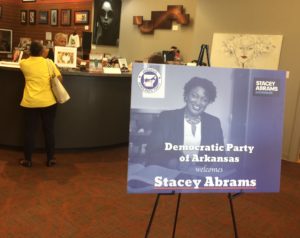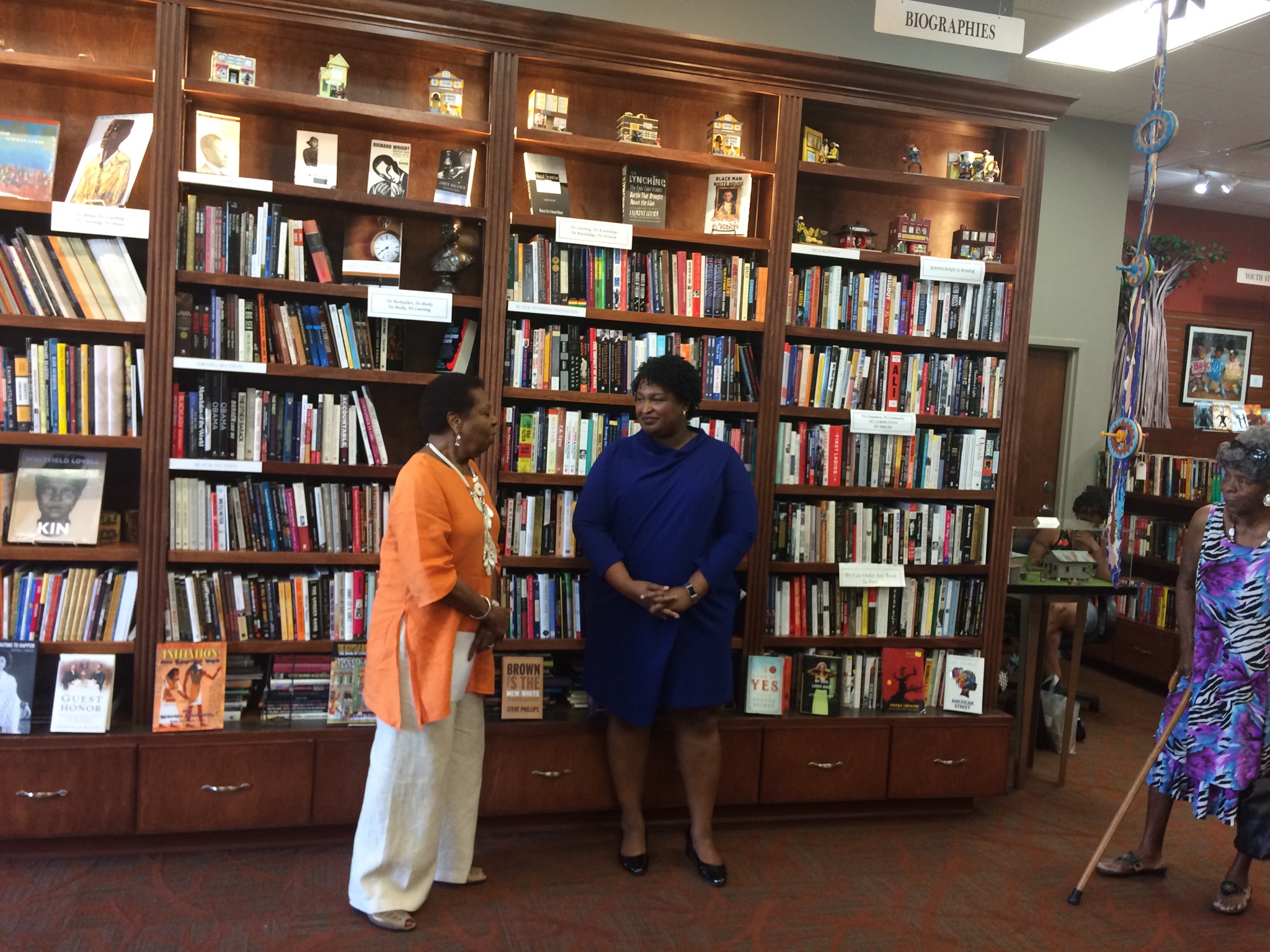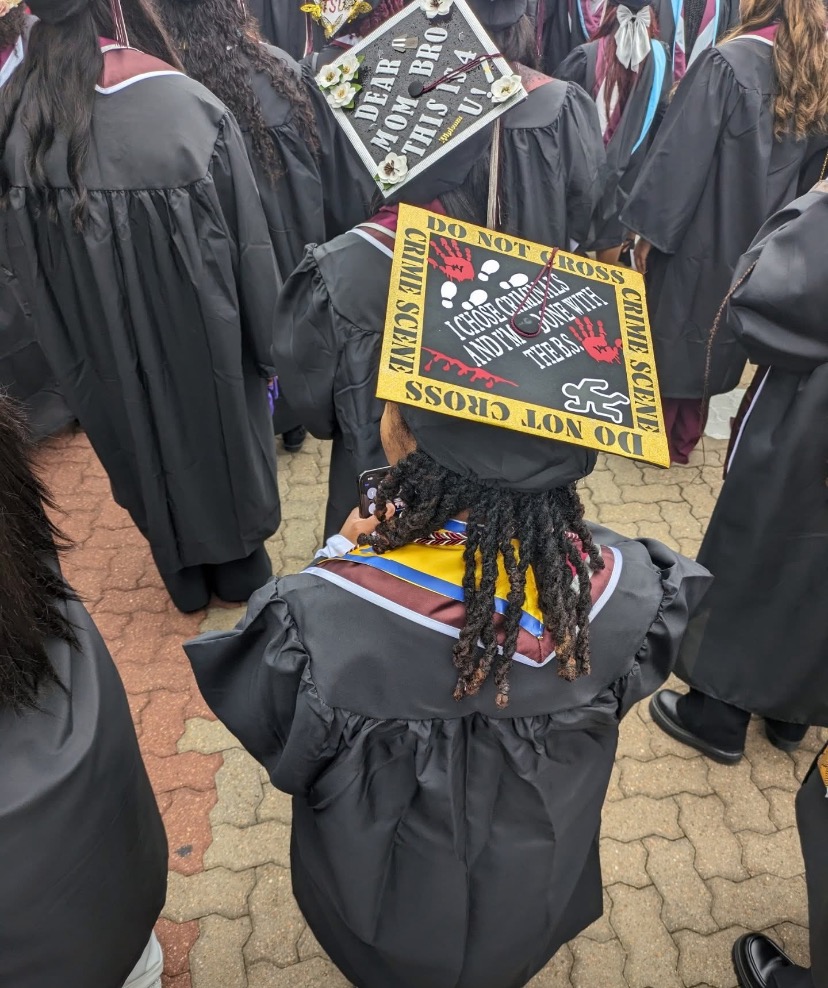The Georgia gubernatorial race is becoming a national race with African Americans around the country rallying behind Democratic candidate Stacey Abrams, the first African American female nominee of a major party for governor.
Former Little Rock Mayor Lottie Shackleford hosted a reception for Abrams at Hearne Fine Art Gallery in Little Rock. Shackleford, the first female and African American mayor of Little Rock, is familiar with the expectations inherent in being “the first.”
 “It’s a lot of excitement on our part as Black women,” Shackelford said. “I’m constantly saying, ‘When you look at the rungs of a ladder whether its politics or economics…White men are at the top, and Black women are on the bottom. The middle varies between Black men and White women. But, the constants are White men at the top, Black women at the bottom.’ But for us as Black women to have a black woman as a major party nominee for governor is a major accomplishment on Stacey’s part and the people of Georgia.”
“It’s a lot of excitement on our part as Black women,” Shackelford said. “I’m constantly saying, ‘When you look at the rungs of a ladder whether its politics or economics…White men are at the top, and Black women are on the bottom. The middle varies between Black men and White women. But, the constants are White men at the top, Black women at the bottom.’ But for us as Black women to have a black woman as a major party nominee for governor is a major accomplishment on Stacey’s part and the people of Georgia.”
At the reception, the Yale-educated lawyer and member of the Georgia state legislature, talked about her parents who worked hard to provide for their six children and stressed faith, education, and service.
“We’re running because we know we are all entitled to this dream called The American Dream,” Abrams told supporters. “We have an obligation in these days to speak truth to power.”
Voting Black in a Red State
President Donald Trump endorsed Republican gubernatorial candidate Brian Kemp , and former President Barack Obama endorsed Abrams.
“Her campaign is ignited by and connected to ‘Yes, We Can,’ the Obama campaign slogan,” Angela Burt pointed out. Burt is the president of the Dunbar Historic Neighborhood Association. “An African American female from the South…it has to be a ‘Yes, We Can.’”
Kemp, who has been Georgia’s Secretary of State since 2010, is currently under fire after several media outlets investigated and found that his official Secretary of State voter app is linked directly to the social media accounts for his campaign. The NAACP is calling for his resignation .
With 96 days until the election, Abrams and her campaign are focused on turning out the vote.
“I think it’s an indicator of the times for women,” said Bob Nash, who worked in the Clinton Administration. “She’s not just chasing windmills. She has a good chance of winning if the turnout is there, Black women and Hispanic women and men who see this as a positive for the state. The only people who will be opposed are the Trumpsters.”
Abrams defeated a White opponent, former state legislator Stacey Evans, to win the Democratic primary, and she did so with more than 70 percent of the vote ().
Abrams’ Little Rock Connection
In Little Rock, the 44-year-old recalled her first election. She ran for student body president at Spelman College and remembered the friends who believed in her. The mother of one of those friends, Dr. Annette Slater, wiped tears from her eyes as Abrams spoke.
 “Hopefully, people will read her book, and she talks about her experiences,” Slater said. “She has the education, the economics, and the experience in politics. She writes about taking responsibility for the gifts God gave you.”
“Hopefully, people will read her book, and she talks about her experiences,” Slater said. “She has the education, the economics, and the experience in politics. She writes about taking responsibility for the gifts God gave you.”
Abrams book, Minority Leader: How to Lead from the Outside and Make Real Change, shares insights from her years as the Minority Leader of Georgia’s House of Representatives. Representative Vivian Flowers, chair of the Arkansas Black Caucus stood among the supporters and used her cell phone to videotape Abrams’ remarks. Flowers said, “Thank you for setting a new standard, breaking barriers and creating a new normal for the country.”


 Black History5 years ago
Black History5 years ago
 Black History6 years ago
Black History6 years ago
 Black History4 years ago
Black History4 years ago
 Black History5 years ago
Black History5 years ago
 Black History5 years ago
Black History5 years ago
 Black History6 years ago
Black History6 years ago
 Black History9 years ago
Black History9 years ago
 Black History5 years ago
Black History5 years ago
 “It’s a lot of excitement on our part as Black women,” Shackelford said. “I’m constantly saying, ‘When you look at the rungs of a ladder whether its politics or economics…White men are at the top, and Black women are on the bottom. The middle varies between Black men and White women. But, the constants are White men at the top, Black women at the bottom.’ But for us as Black women to have a black woman as a major party nominee for governor is a major accomplishment on Stacey’s part and the people of Georgia.”
“It’s a lot of excitement on our part as Black women,” Shackelford said. “I’m constantly saying, ‘When you look at the rungs of a ladder whether its politics or economics…White men are at the top, and Black women are on the bottom. The middle varies between Black men and White women. But, the constants are White men at the top, Black women at the bottom.’ But for us as Black women to have a black woman as a major party nominee for governor is a major accomplishment on Stacey’s part and the people of Georgia.” “Hopefully, people will read her book, and she talks about her experiences,” Slater said. “She has the education, the economics, and the experience in politics. She writes about taking responsibility for the gifts God gave you.”
“Hopefully, people will read her book, and she talks about her experiences,” Slater said. “She has the education, the economics, and the experience in politics. She writes about taking responsibility for the gifts God gave you.”

























